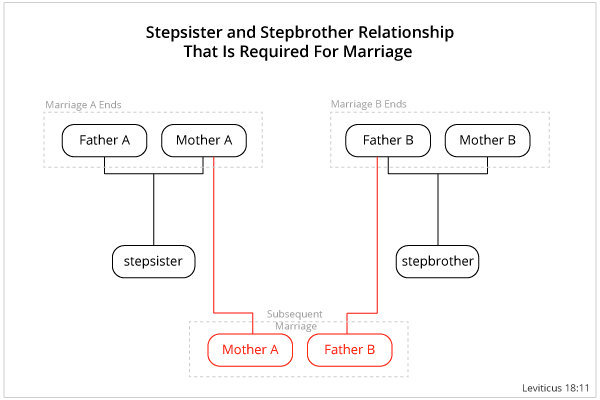Bible Question:
I married my stepbrother, but we were not raised in the same household and I am unsure if this is sin in God's eyes or if our marriage is biblically lawful. Can a stepsister and stepbrother marry according to Leviticus 18:11?
Bible Answer:
God has told us which relatives we cannot marry. As a result, we know which relatives we can marry. In Leviticus 18:7-17 He has given us a list of relationships that are forbidden. For a full explanation, please read “What does the Bible say about marrying your first cousin?” The question we are concerned with is, “Can a stepsister and stepbrother marry according to Leviticus 18:11?”
Definition of Stepsister and Stepbrother
Merriam-Webster defines stepsister as, “a daughter of one’s stepparent by a former partner”[1] and stepbrother as, “a son of one’s stepparent by a former partner.”[2] The prefix “step” refers to someone who was not part of your original family. Thus a stepparent is an adult who was not your actual father or mother, but has married one of your parents after a death or divorce. Thus a stepsister or stepbrother was not part of your original family. The following chart provides a visual definition.
The chart illustrates that after Mother A and Father B lose their original spouses by death or divorce and choose to marry, the daughter of Mother A becomes the stepsister to the son of Father B. Likewise, the son of Father B becomes the stepbrother to the daughter of Mother A. This step relationship will continue to exist even if the marriage of Mother A and Father B comes to an end.
Meaning of Leviticus 18:11
Now what is the meaning of Leviticus 18:11? The New American Standard Bible reads as follows,
The nakedness of your father’s wife’s daughter, born to your father, she is your sister, you shall not uncover her nakedness. Leviticus 18:11 (NASB)
The English Standard Version Bible reads like this,
You shall not uncover the nakedness of your father’s wife’s daughter, brought up in your father’s family, since she is your sister. Leviticus 18:11 (ESV)
Notice that they read very differently. Therefore, we will need to investigate the original Hebrew to determine the meaning. The Hebrew word for “nakedness” is erwa and is sometimes translated as” indecent, indecency, nakedness, bare and shame.” Hebrew lexicons state the word means “private, personal parts of the body” or “genitals.”[3] It has the basic meaning of pudenda or “external genitals.”[4] This means that erwa refers to exposure of the genital area. Thus the phrase “uncover her nakedness” is a euphemism for sexual activity culminating in sexual intercourse.[5]
Next, we must understand that the entire section from Leviticus 18:7-17 is addressed to males (see verses 5-6). Therefore, the phrase “your father’s wife’s daughter” is addressed to males. A male is not allowed to uncover “the nakedness . . .” The daughter in verse 11 then is his stepsister and he is her stepbrother. It is important to realize that verse 11 prohibits marriage between stepsisters and stepbrothers only under one specific situation for two reasons. First, we are told “she is your sister.” Therefore, when is she his sister?
The second reason is that the Hebrew word for “born” is moledet. The word is translated as “relatives” in Genesis 24:2; 31:3; 32:9; 43:7 and Numbers 10:30 in the New American Standard Bible. It is translated as birth in Genesis 24:7; 31:13; Ruth 2:11; Ezekeial 16:3, 4; 23:15. A few times it is translated as kindred, native and born. The reason for discussing how the word is translated is to demonstrate that the word has a broad meaning that refers to the immediate family lineage or descendants. To be specific the word has the basic meaning of “kindred” or “relatives.”[6] That is, she is to be considered his stepsister if she is a descendant within the same family lineage.
This means that if the stepsister is connected to the larger family of blood relatives, she was to be considered as full sister. R. Kent Hughes summarizes the meaning this way,
Although she is a stepsister, she is treated as a blood sister because she was reared in the same household. Marriage among relatives closely connected as blood relatives was outlawed.[7]
But the clearest summary is given by Jacob Milgrom,
Once she enters the father’s family-even though her own father is of a different clan than your father, no matter how distant – she is your sister and prohibited to you. However, if she is of a different clan-there being no common blood-the implication is clear: she may marry you.[8]
The New International Commentary on the Old Testament states,
At any rate a man could certainly seek a wife from within his father’s moledet as long as she was not too closely related to him (Gen. 24:4). This rule states that a man may not marry his step-sister if she was also counted as one of his “father’s kindred.”[9]
This is in agreement with the ESV which is the better translation.
You shall not uncover the nakedness of your father’s wife’s daughter, brought up in your father’s family, since she is your sister. Leviticus 18:11 (ESV)
Therefore, marriage between a stepsister and stepbrother is permitted if her family lineage does not connect with his family lineage. Therefore, the couple should check their family heritage to see if they connect in recent history. What is recent history? That is a judgment call.
Conclusion:
Obviously, if the above reveals that the stepsister and stepbrother can marry, then there is no reason for concern. But what if the above information reveals the stepsister and stepbrother cannot marry? Then if they marry, they are sinning against God. Their marriage is prohibited. But if the stepsister and stepbrother are already married, then they should remain married and not divorce! Why? Because God hates divorce (Malachi 2:16) and Christ declared that once married, the couple should remain together.
So they are no longer two, but one flesh. What therefore God has joined together, let no man separate. Matthew 19:6 (NASB)
It is clear that Leviticus 18:11 is not designed as a protection for the couple or because there is some sin issue with the couple. Instead it is a safeguard for their children. It is designed to safe guard the offspring of the couple and the offspring’s subsequent offspring against genetic defects. Obviously, the prohibition does not directly impact the couple (stepsister and stepbrother), unless their children are affected. Therefore, if you are a stepsister and stepbrother who have married and you believe that as a result of the above information that you should not have married, you are encouraged to remain married and enjoy God’s blessing. Do not divorce! However, you may want to speak with medical professionals about the wisdom of having children.
References:
1. Merriam-Webster Dictionary (merriam-webster.com/dictionary/stepsister).
2. Merriam-Webster Dictionary (merriam-webster.com/dictionary/stepbrother).
3. James Swanson, Dictionary of Biblical Languages with Semantic Domains : Hebrew (Old Testament) (Oak Harbor: Logos Research Systems, Inc., 1997).
4. Francis Brown, Samuel Rolles Driver, and Charles Augustus Briggs. Brown-Driver-Briggs Hebrew and English Lexicon. Hendrickson Publishers. 1996. p. 788.
5. Mark F. Rooker. Leviticus. The New American Commentary. B&H Publishing. 2000. vol 3A. p. 243.
6. R. Laird Harris, Gleason L. Archer Jr., and Bruce K. Waltke, eds., Theological Wordbook of the Old Testament. Moody Press. 1980. vol. 1, p. 378.
7. R. Kent Hughes. Leviticus. Preaching The Word. Crossway Books. 2009. p. 159.
8. Jacob Milgrom. Leviticus. Fortress Press. 2004. p. 204.
9. Gordon J. Wenham. The Book of Leviticus. The New International Commentary on the Old Testament. Eerdmans Publishing. 1979. p. 257.

